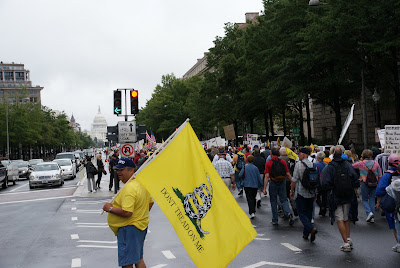I've marched for lots of reasons. When I was young, I marched because my dad was marching and I, like an imprinted duckling, followed. I marched in protest of a war I didn't fully understand, but felt out of principle war was a bad idea. I marched to Save the Whales and that helped for a while. It's probably time to march again for that. I marched against military invasion of Granada. In college by then, so I had a little more political savvy than I had had the first time I protested war when I was still young enough to ride a banana seat stingray. But, in truth, I still don't understand the nuances of war. I see them as an action of absolute last resort. If I believe a war is treated as any way otherwise, I'm against it.
A few days ago while walking around Washington D.C., I came across a march of Tea Party constituents. I have to say, it was a strange experience. On the one hand, I recognized the slow gait of the marchers--the sign-holding, chanting, and crowd makes marching a low cardio form of exercise. I felt that familiar twinge of excitement in seeing a big group of citizens taking to the streets to get their voices heard. I love it when people exercise their constitutional rights in ways that don't cause physical harm to others. Regardless of whether or not I agree with whatever it is they are saying, I think it one of the coolest things Americans do.
 Yet, while standing by a lightpole, watching the marchers march by wearing bright yellow tee shirts and chanting "Who are we?. . .Americans!", I also worried about media and business propaganda and the manipulation of citizens with fear-mongering and its affect on our exercising of these rights. The cynic in me wonders who is financing the Tea Party movement. Is it really a grass roots movement or does it have corporate sponsorship? Why is everyone Caucasian? And generally old? Why was one guy carrying a sign in support of Sheriff Joe Arpaio? What is this all about? I didn't ask these kinds of questions when I tagged along behind my father. I took it on faith that his views were right. Or right, by being left. Why am a patriotic cynic now?
Yet, while standing by a lightpole, watching the marchers march by wearing bright yellow tee shirts and chanting "Who are we?. . .Americans!", I also worried about media and business propaganda and the manipulation of citizens with fear-mongering and its affect on our exercising of these rights. The cynic in me wonders who is financing the Tea Party movement. Is it really a grass roots movement or does it have corporate sponsorship? Why is everyone Caucasian? And generally old? Why was one guy carrying a sign in support of Sheriff Joe Arpaio? What is this all about? I didn't ask these kinds of questions when I tagged along behind my father. I took it on faith that his views were right. Or right, by being left. Why am a patriotic cynic now?My faith in the American structure of society took a huge hit when the Supreme Court weighed in on the disputed election results in Florida during the Gore v. Bush presidential race. In my mind, if the Supreme Court was going to enter into politics, then nothing was sacred. Everything, including the Constitution was fair game for political manipulation. I used to really admire the Supreme Court, but I didn't even bother to stand on the famous front steps of the courthouse on this recent visit to Washington. Some of the justices who made the decision to render a decision on the election were already retired or deceased, but I'm still disillusioned. Had I just been illusioned for most of my life? Is truth really fiction? Are our rights inalienable or are they manipulable? Is Right all that's left? Is Right right? Has Left left? Politics hurts both hemispheres of my brain.
When I came home, every morning this week I was roused awake by my radio alarm to a story on the tea-party movement, parts of a week-long series on NPR. Here's what I learned in between snoozes:
- Tea Partyers are, according to Jonathan Rauch, contributing editor at the National Journal and guest scholar at the Brookings Institution: "White, Bright, and Right," meaning they are in fact mostly Caucasian, and are also educated and right-wing conservatives.
- Tea Party backed candidates are also funded by the medical community and oil industry. Not sure why.
- Tea Party constituents don't agree on everything, just like most any big groups of people
Personally, I'm a coffee drinker, but marching for a cause is still a really cool inalienable right.
No comments:
Post a Comment